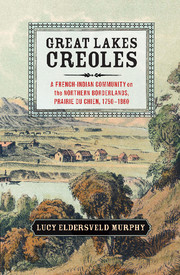 Great Lakes Creoles
Great Lakes Creoles Book contents
- Frontmatter
- Dedication
- Contents
- List of Tables
- List of Figures
- Acknowledgments
- Introduction
- 1 “The Rightful Owners of the Soil”
- 2 “To Intermeddle in Political Affairs”
- 3 “Damned Yankee Court and Jury”
- 4 Public Mothers
- 5 “A Humble … People”
- 6 Blanket Claims and Family Clusters
- Conclusion
- Epilogue
- Index
- References
4 - Public Mothers
Women, Networks, and Changing Gender Roles
Published online by Cambridge University Press: 05 September 2014
- Frontmatter
- Dedication
- Contents
- List of Tables
- List of Figures
- Acknowledgments
- Introduction
- 1 “The Rightful Owners of the Soil”
- 2 “To Intermeddle in Political Affairs”
- 3 “Damned Yankee Court and Jury”
- 4 Public Mothers
- 5 “A Humble … People”
- 6 Blanket Claims and Family Clusters
- Conclusion
- Epilogue
- Index
- References
Summary
Angelique Brisbois was the daughter of Michel Brisbois and his Ho-Chunk first wife, Chambreywinkau. Growing up in a bicultural fur-trade family, she learned not only about the business but also about both parents’ cultures, and so she became bilingual and entrepreneurial. Because her mother came from an elite Ho-Chunk family and her father was an important man in fur-trade circles, she was highly respected, but with her high status came high expectations for community service. Angelique used her family connections to become a fur trader among the Ho-Chunks on the Fox River in east-central Wisconsin along with her husband Jean Baptiste Pion. They made their home in Prairie du Chien and raised two children. Angelique served her community as a mediator and hostess: Indian agent Nicolas Boilvin frequently recruited Angelique to serve as an interpreter, and when Ho-Chunks visited Prairie du Chien, they knew they could always find at Angelique’s home a place to sleep and a warm meal. Angelique’s actions were typical of many of Prairie du Chien’s Creole women, who reached out to Native and non-Native people, creating and tending connections that would benefit their community.
Angelique and her neighbors lived in the shadow of war. The War of 1812–16 had followed upon sporadic violent conflicts around the Midwest that stretched back for many decades. In addition, from 1822 through 1832, violence flared in the lead region to the south between American miners and Native people, erupting into the Winnebago Revolt of 1827, followed by the Sauk rebellion known as the Black Hawk War of 1832. These convulsions of colonialism created tensions, fear, suspicions, and suffering that affected the attitudes of habitants, Natives, officials, and other Americans toward each other. The “white persons skulking” law had revealed some of these antipathies. Other events would contribute to ill feelings with the potential to harden relationships and social categories. But mediators – many of whom were women – offered alternatives to violence, and many were very successful. During, between, and after these violent times, governmental, demographic, and economic changes troubled the community of Prairie du Chien, but in spite of significant challenges, some women found both familial and communal means to compensate, repair, and resist disruptions.
- Type
- Chapter
- Information
- Great Lakes CreolesA French-Indian Community on the Northern Borderlands, Prairie du Chien, 1750–1860, pp. 148 - 186Publisher: Cambridge University PressPrint publication year: 2014
